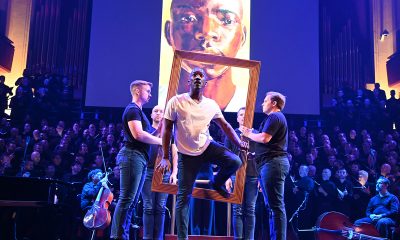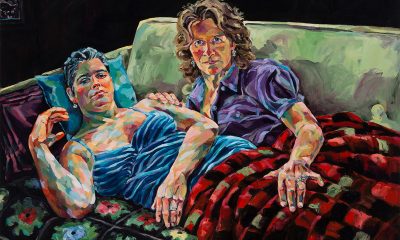Theater
Sophie Zmorrod embracing life on the road in ‘Kite Runner’
First national tour comes to Eisenhower Theater on June 25

‘The Kite Runner’
June 25 – 30
The Kennedy Center
$39-$149
Kennedy-center.org
Newly single, Sophie Zmorrod is enjoying life on the road in the first national tour of “The Kite Runner,” Matthew Spangler’s play with music based on Khaled Hosseini’s gripping novel about damaged relationships and longed for redemption.
“It’s a wonderful time for me,” says Zmorrod. “I’m past the breakup pain and feeling empowered to explore new cities. A lot of us in the cast are queer, so we figure out the scene wherever the show goes.”
What’s more, the New York-based actor has fallen in love with the work. “I love how the play’s central character Amir is flawed. He is our antihero. He has faults. As a privileged boy in Kabul, he bears witness to his best friend’s assault and doesn’t intervene. He lives with that guilt for decades and gets that redemption in the end.”
“He does what he can to right wrongs. For me who’s regretted things, and wished I could go back in time, it resonates. Watching someone forgive themselves and do the right thing is beautiful.”
Via phone from Chicago (the tour’s stop before moving on to Kennedy Center Eisenhower Theater on June 25), Zmorrod, whose background is Lebanese, happily chats about sexuality, ethnicity, and acting.
WASHINGTON BLADE: Looking at your resume, I see you’ve been cast in roles traditionally played by men. And have you played queer characters?
SOPHIE ZMORROD: Oh yes, both. Whether or not they’re written on the page as queer, they sometimes turn out that way. And that holds true for this show too.
With “The Winter’s Tale” at Trinity Rep, I played Leontes — the king who banishes his wife — as a woman. So, in that production it was about two women and touched on the violence that women sometimes inflict on other women.
And there was Beadle Bamford in Sondheim’s “Sweeney Todd” also at Trinity Rep; I played him as a woman who was masculine and wore a suit. It was a great opportunity to explore myself and gender expression. That was a really good experience.
BLADE: Are you an actor who’s often be called in for queer roles?
ZMORROD: Not really. I’m what you might call straight passing. Sometimes I’ve had to advocate for my queerness. To be a part of something.
Similarly with my ethnicity. I’m called in to audition for the white and Arab roles. It gets tricky because I’m not the exactly the white girl next door and I’m not exactly Jasmine from Disney’s “Aladdin” either.
This is one of the reasons, I really want people to come see “The Kite Runner,” Audiences need to experience the reality of the wide diversity of Middle Eastern people on the stage. We’re all very different.
And not incidentally, from this 14-person cast, I’ve met some great people to add to those I know from the Middle Eastern affinity spaces and groups I’m connected to in New York.
BLADE: In “The Kite Runner” what parts do you play?
ZMORROD: Three characters. All women, I think. In the first act, I’m an elderly eccentric pomegranate seller in the Afghan market, waddling around, speaking in Dari [the lingua franca of Afghanistan]; and the second act, I’m young hip and sell records in a San Francisco market; and at the end, I’m a buttoned-down American immigration bureaucrat advising Amir about adoption.
BLADE: Your training is impressive: BA cum laude in music from Columbia University, an MFA in acting from Brown University/Trinity Repertory Company, and you’re also accomplished in opera and playwrighting, to name a few things. Does “The Kite Runner” allow you to flex your many muscles?
ZMORROD: Very much. Playing multiple roles is always fun for an actor – we like malleability. Also, there are instruments on stage. I like working with the singing bowl; it’s usually used in yoga as a soothing sound, but here we save it for the dramatic, uncomfortable moments. I also sing from offstage.
We are creating the world of the play on a very minimal set. Oh, and we do kite flying. So yeah, lots of challenges. It’s great.
BLADE: It sounds like you’re in a good place both professionally and personally.
ZMORROD: It’s taken a long time to feel comfortable. But I’m on the journey and excited to be where I am, and who I am.
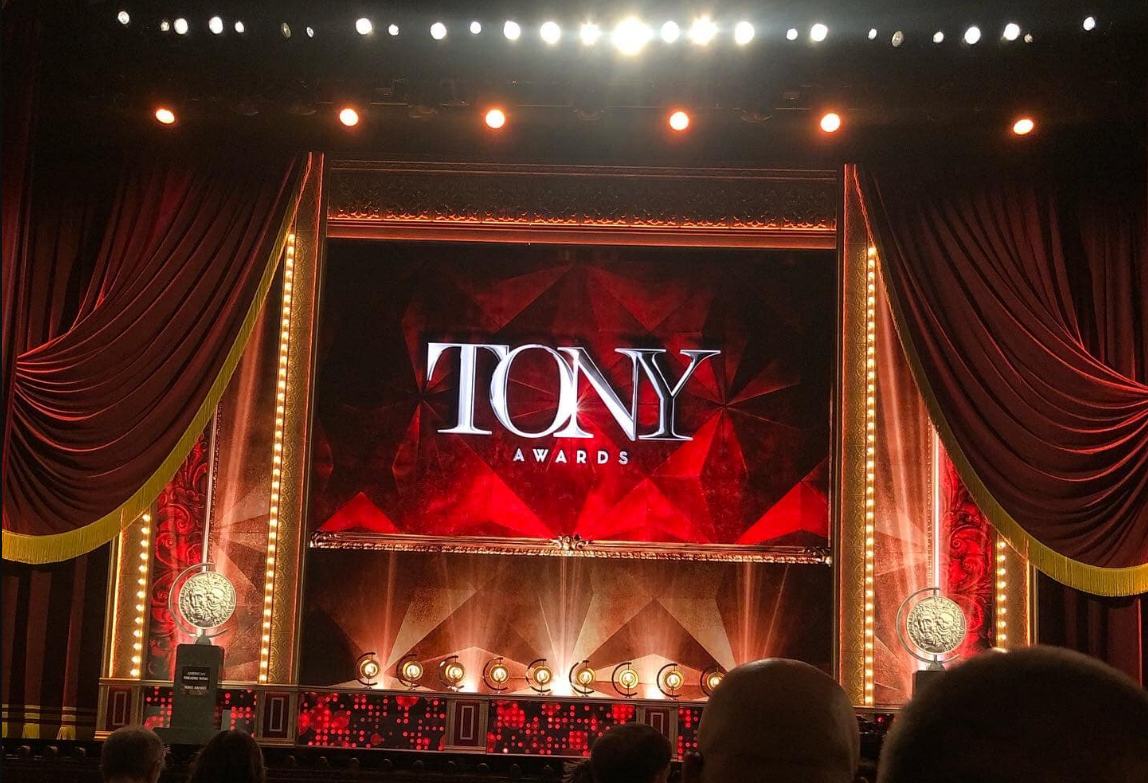
It was a banner night for queer theater artists at the 77th annual Tony Awards, honoring the best in Broadway theater at the Lincoln Center in New York on Sunday. Some of the biggest honors of the night went to the revival of the Stephen Sondheim musical “Merrily We Roll Along” and the dance-musical based on Sufjan Stephens’ album “Illinoise.“
“Merrily We Roll Along,” which follows three friends as their lives change over the course of 20 years, told in reverse chronological order, picked up the awards for Best Revival of a Musical and Best Orchestrations.
Out actor Jonathan Groff picked up his first Tony Award for his leading role as Franklin Shepard in the show, while his costar Daniel Radcliffe earned his first Tony Award for featured performance as Charley Kringas.
Groff gave a heartfelt and teary acceptance speech about how he used to watch the Tony Awards as a child in Lancaster County, Pa.
“Thank you for letting me dress up like Mary Poppins when I was three,” he said to his parents in the audience. “Even if they didn’t understand me, my family knew the life-saving power of fanning the flame of a young person’s passions without judgment.”
Groff also thanked the everyone in the production of “Spring Awakening,” where he made his Broadway debut in 2006, for inspiring him to come out at the age of 23.
“To actually be able to be a part of making theatre in this city, and just as much to be able to watch the work of this incredible community has been the greatest pleasure of my life,” he said.
This was Groff’s third Tony nomination, having been previously nominated for his leading role in “Spring Awakening” and for his featured performance as King George III in “Hamilton.”
Radcliffe, who is best known for starring in the “Harry Potter” series of movies, has long been an ally of the LGBTQ community, and has recently been known to spar with “Harry Potter” creator JK Rowling over her extreme opposition to trans rights on social media and in interviews. It was Radcliffe’s first Tony nomination and win.
Lesbian icon Sarah Paulson won her first Tony Award for her starring role in the play “Appropriate,” about a family coming to terms with the legacy of their slave-owning ancestors as they attempt to sell their late father’s estate. It was her first nomination and win.
In her acceptance speech, she thanked her partner Holland Taylor “for loving me.” Along with Paulson’s Emmy win for “American Crime Story: The People vs. O.J. Simpson,” she is halfway to EGOT status.
The Sufjan Stephens dance-musical “Illinoise,” based on his album of the same name, took home the award for Best Choreography for choreographer Justin Peck. It was his second win.
During the ceremony, the cast of “Illinoise” performed “The Predatory Wasp of the Palisades is Out to Get Us!”, a moving dance number about a queer romance.
A big winner of the night was the adaptation of the S.E. Hinton novel “The Outsiders,” which dominated the musical categories, earning Best Director, Sound Design, Lighting Design, and Best Musical, which earned LGBTQ ally Angelina Jolie her first Tony Award.
Also a big winner was “Stereophonic,” which dominated the play categories, winning the awards for Best Play, Featured Actor, Director, Sound Design, and Scenic Design.
“Suffs,” a musical about the fight for women’s suffrage in the U.S., which acknowledges the lesbian relationship that suffragist Carrie Chapman Catt had in song called “If We Were Married,” took home awards for Best Book of a Musical and Best Score, both for creator Shaina Taub.
Had “Suffs” also won for Best Musical, producers Hilary Clinton and Malala Yousafzai would have won their first Tony Awards.
Other winners include Maleah Joi Moon for her lead role and Kecia Lewis for her featured role in the Alicia Keys musical “Hell’s Kitchen,” Jeremy Strong for his lead role in An Enemy of the People, and Kara Young for her featured role in “Purlie Victorious: A Non-Confederate Romp Through the Cotton Patch.”
Theater
‘Rose: You Are Who You Eat’ an irreverent romp at Woolly Mammoth
Solo performance by John Jarboe offers much to consume

‘Rose: You Are Who You Eat’
Though June 23
Woolly Mammoth Theatre Company
641 D St., N.W.
$60-$82
Woollymammoth.net
With “Rose: You Are Who You Eat,” a solo performance by John Jarboe (she/her), now at Woolly Mammoth Theatre Company, there’s a lot to uncover and consume.
For much of the show, you might think the appealing Jarboe is playing dress up in a pair of tighty-whities and sparkly go-go boots, but it’s something else and she’s ready to go there.
Jarboe is a cannibal. Not in the usual sense. She learned from a well-meaning aunt that while still in the womb, she ate her twin, and that’s what made Jarboe the way she is (a reference to gender queerness).
Despite the aunt’s awkward delivery of family dish, the prenatal news struck a chord with Jarboe: the vanishing twin who would have been named Rose, became increasingly connected to her own identity. Along with the inevitable jokes about eating her sister’s spaghetti thin hair and tasty eyeballs, there’s meaty matter unfolding onstage.
Not entirely unexpected, Jarboe also harbors mommy issues. Mom, here referred to as “Mother” for the sake of anonymity, is a buttoned-down tax accountant who the more perturbed she becomes the wider her forced smile grows. And while Jarboe needs to have that long overdue talk with Mother, something always seems to get in the way; invariably it’s tax season.
Assisted by some primary source props (a baby book, notes, a string of pearls filched from Mother’s jewelry box), Jarboe further digs into gender expression and identity. Her performance career began in her child bedroom closet with a flashlight and makeshift costume, an obsession to which her parents initially subscribed, later not as much.
Among the 75-minute-long show’s highlights are five or so songs, rock numbers and redolent ballads composed by Jarboe, Emily Bate, Daniel de Jesús, Pax Ressler and Be Steadwell.
It’s definitely a solo show conceived and delightfully performed by Jarboe; however, she’s supported by a terrific four-person band (costumed in what appeared from Row D to be rosebush inspired jumpsuits) including Mel Regn, Yifan Huang, Daniel de Jesús, and music director Emily Bate. Bate is a singer, composer and performer who runs a queer and trans community chorus in Philadelphia called Trust Your Moves, an experiment in collective singing designed around liberation and co-creation.
As Jarboe moves into her 30s, she celebrates and incorporates her lost twin as part of herself with a new intensity. She writes letters, yearning for even the most tepid reply. Her obsession with Mother remains a thing too.
Dressed in a sylphlike rosy red gown (by costume designer Rebecca Kanach) Jarboe uses call-and-response (with the audience standing in for Mother) in search of some resolution. It’s beautifully done.
With various kinds of backing coming from CulturalDC, the Washington Blade, Capital Pride, the Bearded Ladies Cabaret and other New York-based groups, there’s nothing itinerant cabaret looking about “Rose.” Directed by MK Tuomanen, it’s an elevated, visually engaging production.
For instance, set and video designer Christopher Ash’s projections shown on both a serviceable scrim and later a wondrously huge toile curtain, beautifully feature photos from an ostensibly idyllic Midwestern childhood. We see a young Jarboe not only enjoying hockey, fishing, and hunting, but also pulling off a strikingly girly, cheesecake pose.
At the top of the show, there’s live video of Jarboe’s outsized mouth devouring wings fished from a bucket of fried chicken. Hints of cannibalism?
“Rose: You Are Who You Eat” is an irreverent romp, deeply personal yet relatable. It’s an evening of poignantly performed moments, off the cuff laughs, and some awkward/sexy audience interaction.
As a performer, Jarboe lays herself bare, exposing strengths (rich melodious voice, presence, ingenuity) and weaknesses (garrulity and more than a few un-landed jokes) in equal turns.
Hers is a world that invites audiences to just let go and go with it. Jarboe’s intrepid journey melds the familiar and the startling. In short, it’s a trip worth taking.
Theater
‘Portraits’ offers thoughtful storytelling told through art, music, dance
Kennedy Center world premiere on June 16 features lesbian artist Joan Cox
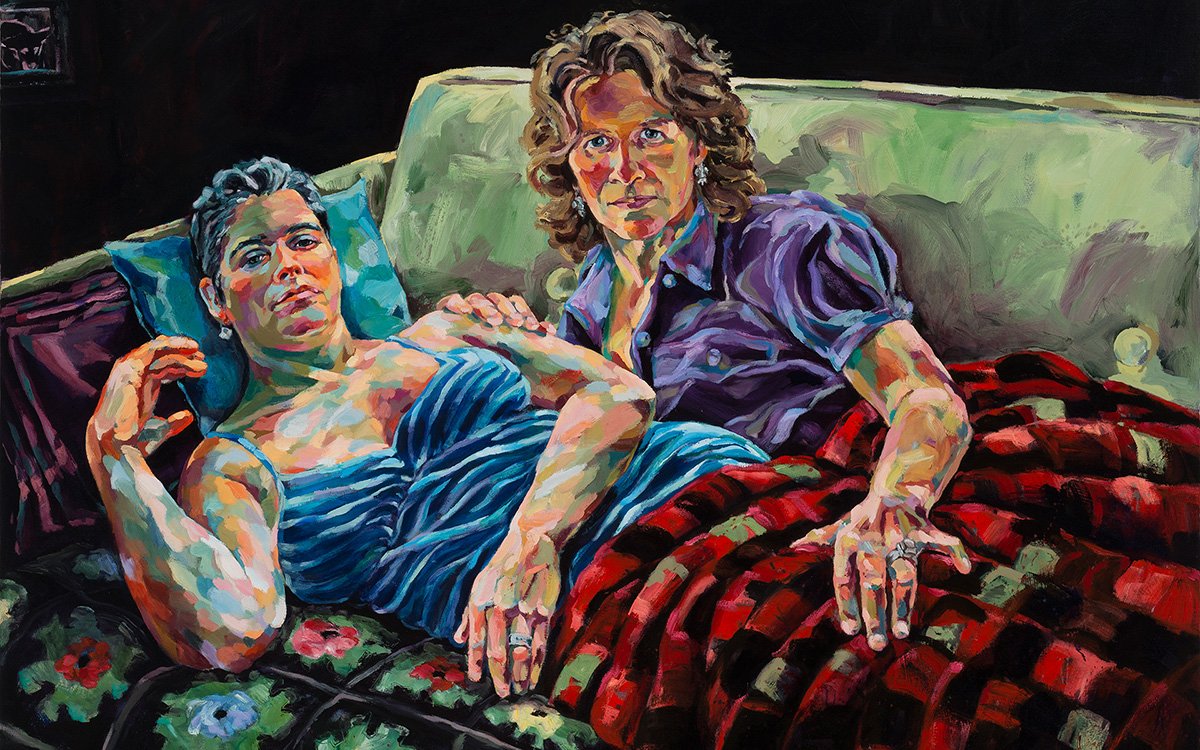
‘Portraits’
Gay Men’s Chorus of Washington
Sunday, June 16, 5 p.m.
The John F. Kennedy Center for the Performing Arts
2700 F St., N.W.
$25–$80
Gmcw.org
Right on time for Pride, the Gay Men’s Chorus of Washington, D.C. (GMCW), presents “Portraits,” a one night only, not to be missed, world premiere concert at the Kennedy Center Concert Hall.
Without the camp found in some of GMCW’s terrific holiday programming, “Portraits” is 90 minutes of thoughtful storytelling told through visual art, music, and dance. Several years in the making, the uniquely collaborative effort covers a lively spectrum of sexual, gender, racial, ethnic, and cultural identities in a nine-movement oratorio commission, combining the stunning work of nine visual artists, nine composers, and nine choreographers, sung by the Chorus and featuring 17th Street Dance.
“For Us,” one of the nine musical pieces, is anchored by “Night Hunger,” a striking oil painting by Baltimore-based lesbian artist Joan Cox. Selected through open competition, her compelling piece is a double portrait featuring the artist and her wife Mare at home reclining on a couch in their lived in home. With her canvas, Cox simultaneously achieves a sense of strength and profound yet casual intimacy.
“It’s a big painting (50 x 60 inches). Really big, featuring partners on a sofa perfect to hang over a sofa,” she says with a chuckle. “For ‘Portraits,’ the idea is my painting and the other exciting works will be projected onstage at the Kennedy Center with music and dance sort of like mini-musicals.”
Completed in 2012, while Cox was part of a Massachusetts College of Art and Design residency program in Provincetown, “Night Hunger” proved a seminal moment for the artist both personally and professionally. “I’d been closeted for a long time, and this work helped me to deal with outness and where I wanted to go as an artist,” she says.
With its figures’ recumbent poses and direct engagement with the viewer, the work harks back to the Odalisque, a genre traditionally painted by and for men. But not so here. Cox says, “You can come into this intimate space, but not too far.”
The musical element of the collaboration comes compliments of Richard Clawson, a longtime singing member and commissioned composer for Atlanta’s OurSong, an LGBTQ choral group with a rich history and a strong commitment to promoting acceptance, diversity, and social justice through music.
After hearing Cox reflect on her painting, about it not being geared toward the male gaze, Clawson had an increasingly clearer vision as to what her vibrant painting was all about. Admittedly, he is guided more by words than images. He says, “words tell me where I’m going.”
Not comfortable as a lyricist, Clawson tapped friend Caroline Peacock, an amateur lesbian poet and fellow chorister at OurSong, to provide the words. She was happy to oblige.
When neither writing nor singing, Peacock is an Episcopal priest and chaplain educator who directs the Spiritual Health program at Emory Winship Cancer Institute. She says the lesbian connection with a work isn’t its only strength. It must be celebrated for its kindness and tenderness too.
The final bit of magic sprinkled upon the collaboration is choreography. With “For Us,” it’s James Ellzy, a family physician at the Defense Health Agency by day, and choreographer/dancer/chorister the rest of the time, who brings it together.
“By the time it gets to me, the painter, composer, and lyricist are done. But for the choreographer, it’s just starting,” Ellzy says. “My job is to explore the back story and bring it to life. For this piece, I’m using two blankets from the original painting and bringing them out to something new.”
A lyric from “For Us” reads “not for the gaze of men” The choreographed piece includes a female couple and dance corps who are purposely not looking at the two women at times, especially when the “gaze of men” is sung.
Ellzy’s connection with GMCW began as a guest artist in 2010 and then joining in 2011. He’s a baritone in the Chorus as well as a board member, and describes the interdisciplinary “Portraits” as extremely unusual but possibly comparable to Stephen Sondheim’s “Sunday at the Park with George” in which the painting comes to life.
All the “For Us’” artists are honored to have been selected to participate, and are looking forward to their respective efforts being shown/sung/heard at the Kennedy Center, especially during Pride month. It’s not an everyday occurrence, they agree.
Cox is thrilled how the collaborative team has been absorbed by the artistic and personal details involving her 23-year long love story. She’s delighted by the experience, saying the work validates her journey as an artist and an LGBTQ advocate.
And Peacock, speaking for the group, sums it up: “It’s incredibly gratifying to do things that bring us joy, and when those things have a place in our world, it’s a great gift.”
-
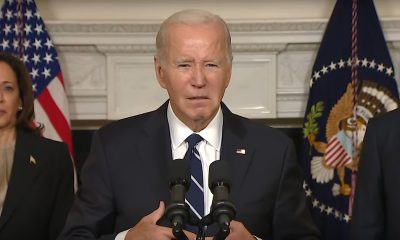
 The White House1 day ago
The White House1 day agoHISTORIC: Biden pardons discharged LGBTQ veterans
-
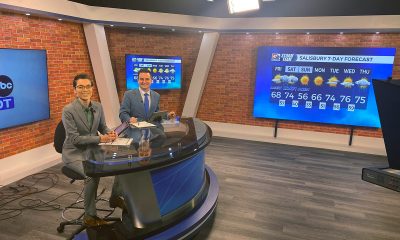
 a&e features1 day ago
a&e features1 day agoQueer TV anchors in Md. use their platform ‘to fight for what’s right’
-
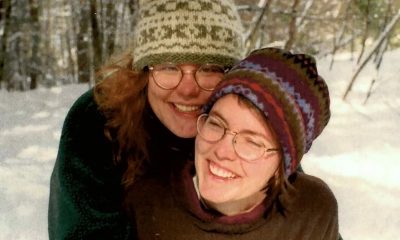
 Virginia4 days ago
Virginia4 days agoSuspect in 1996 murder of lesbian couple in Shenandoah National Park identified
-
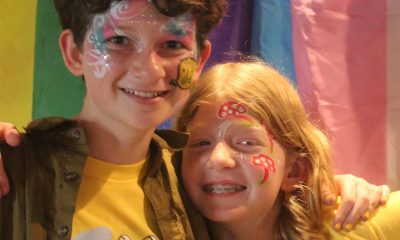
 Local3 days ago
Local3 days agoCamp Free2Be helping trans youth find community

